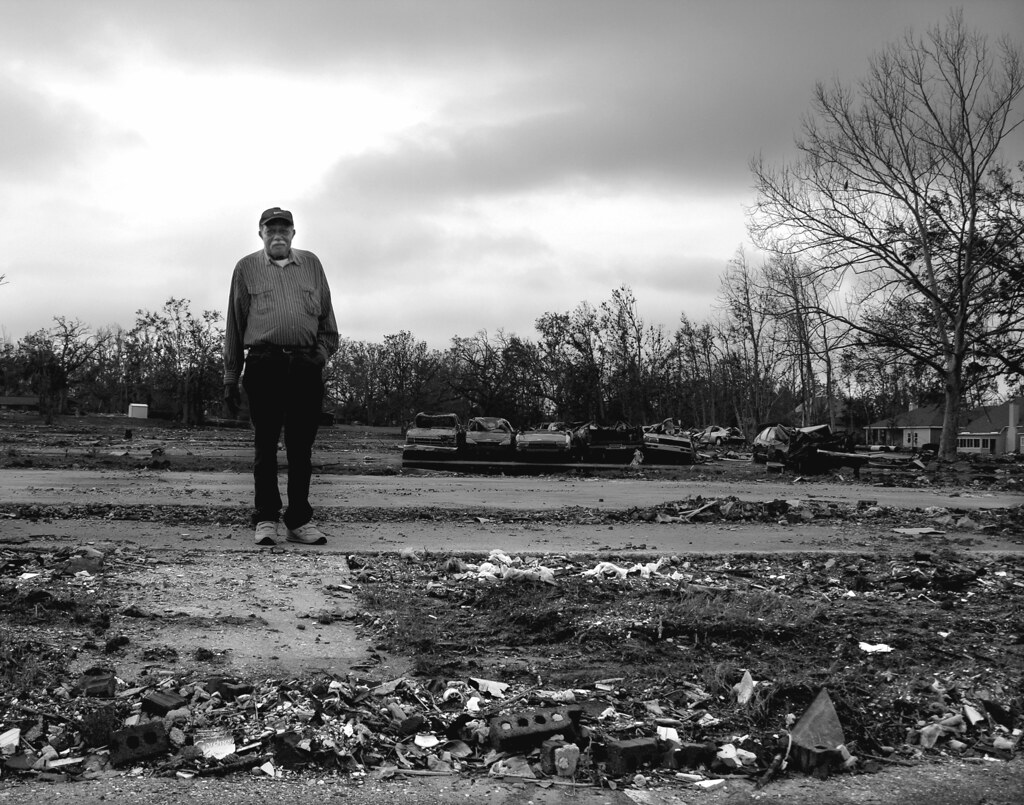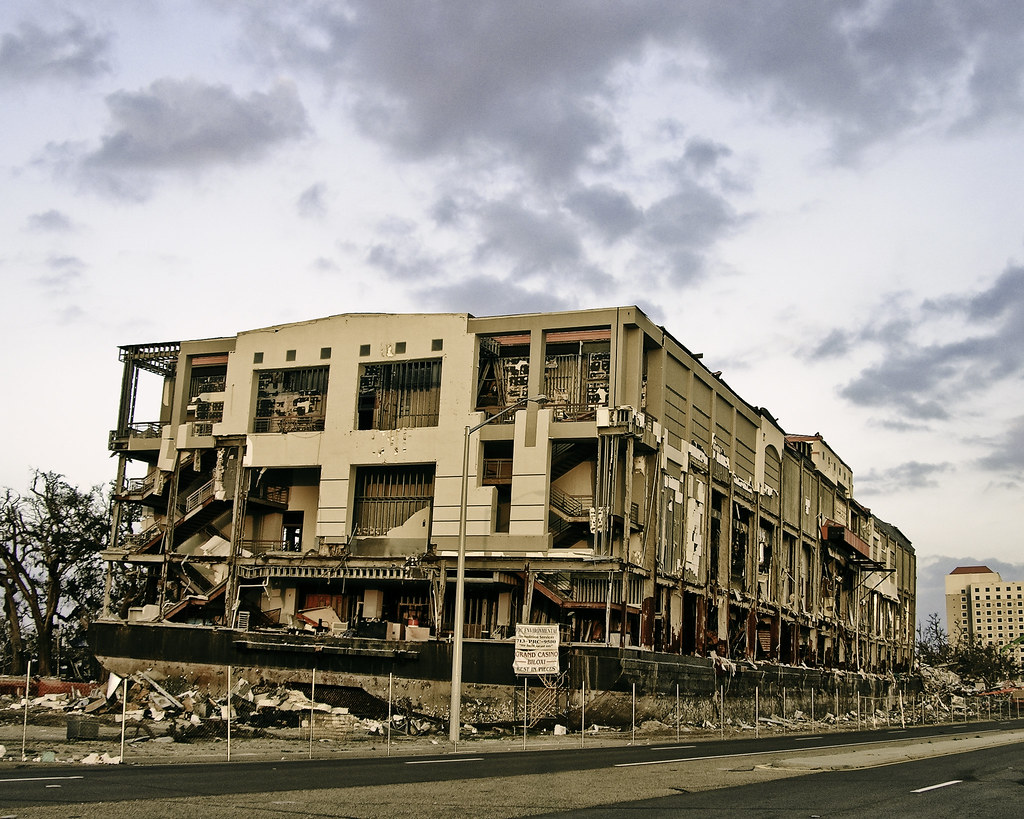On August 29, 2005, the eye of Hurricane Katrina made landfall in Waveland, Mississippi, and the western side of the storm grazed New Orleans. Five months after the storm, I visited the Mississippi Gulf Coast.
According to a National Hurricane Center report on Katrina, "in many locations, most of the buildings along the coast were completely destroyed, leaving few structures within which to identify still-water marks." The center's researchers estimate that the hurricane produced a storm surge as high as 27 feet in some locations.
It was dumbfounding to drive along the coast in Biloxi and find the Grand Casino on the north side of Highway 90. Before Katrina, the casino was on a barge, docked off the beach, south of the highway. The storm surge lifted the casino barge out of the water, over the beach and over the highway. If you stand at the western end of the barge and look east, you can see the yellow and blue neon sign, a half mile down the road, where the barge originally sat. The same thing happened to two other casino barges—the President Casino in Biloxi, which landed on top of a Holiday Inn, and the Gulfport Grand Casino....
The national media have covered the near-total destruction of Bay St. Louis and Waveland. Driving along Beach Boulevard in the two towns, I saw a few people who had returned and were living in trailers on their plots of land, but practically everything was deserted. All that remained were the merest remnants of homes and the things that had been inside them....
In each place I visited along the western half of Mississippi's Gulf Coast, the look of the destruction was a little different, but it was consistently total. And surprisingly, the destruction in the coastal areas of Pascagoula, at the eastern end of the state, is comparable. I remembered George W. Bush's promise to rebuild another "fantastic house" for Trent Lott on the Pascagoula beachfront. I did not know that 95% of the city's residential areas went underwater or that 65% of the city's homes remain uninhabitable. Northrop Grumman Ship Systems' facility in Pascagoula, which before Katrina employed 19,800 people, was all but obliterated.
Hurricane Katrina wiped out the entire Gulf Coast of Mississippi. The scale of the destruction is difficult to comprehend. All along the coast—mile after mile—just about anything that was there is now gone.
But this is only part of the story. According to the National Hurricane Center, the surge "penetrated at least six miles inland in many portions of coastal Mississippi and up to 12 miles inland along bays and rivers. The surge crossed Interstate 10 in many locations." Interstate 10 runs east-west, four miles or more north of coastal Highway 90.
Gayle Tart's brother Sam and his son John died in Pass Christian during the hurricane, on John's second birthday. Tart explained that father and son had drowned inside their own home.
"Water never came down there [before Katrina]. That's across the track. [With Katrina] that water came in and that water went out, and the velocity was unbelievable," Tart said. "The first boundary was the beach and the next boundary was the highway. The day after the storm, you saw neither—no beach and no highway."
When I wrote this for Dollars & Sense Magazine in 2006, I focused on the housing crisis faced by Katrina survivors in Mississippi. Today, at the fourth anniversary of the storm, the housing crisis rages on, thanks to government inaction and skewed priorites.
Small rental and workforce housing progress has fallen dramatically short of State predictions, and so Mississippi has asked HUD for additional funds to temporarily subsidize lower-income residents in market rate rentals....
- Mississippi has allocated just over half its funds on housing, and has lowered its commitment to housing by over $800 million in the past 2 years. Louisiana has allocated over 85 percent to housing programs and increased its commitment over the same period.
- Mississippi has spent just under half its funds, while Louisiana has spent almost 68 percent of its funds, widening its lead over Mississippi.
- Mississippi diverted $600 million from its housing program to a port expansion, while Louisiana intends to reinvest $600 million in unused Road Home funds for housing assistance for low-income residents.
- Mississippi took longer to spend less later for low-income residents than for wealthier residents.
But the housing crisis was just one part of the ongoing disaster. Katrina has also been a cultural and ecological disaster of epic proportions.

A family photo rests on the foundation slab of a home obliterated by Hurricane Katrina in Bay St. Louis, Mississippi.
I emphasize Mississippi in this blog post because I know that nearly all of the fourth anniversary coverage of the ongoing Katrina aftermath, will focus myopically on New Orleans. The situation in New Orleans is still dire. The housing crisis is dire. But there will not be an adequate recovery until the interconnectedness of regions and issues becomes a fundamental insight that drives policy.
While poor and minority survivors and activists will agree (if anyone asks them) that they face multiple, interconnected disasters in the aftermath of Katrina and Rita, this basic local insight goes largely unrecognized. Government failure is certainly most responsible for a "recovery" that has been arbitrary, resource-driven, and slow rather than holistic, need-driven, or effective. But no one, progressives as a group included, has adequately depicted, let alone offset, that failure. Narrowly focused aid has often segregated otherwise related issues, making one or another worse and masking the lack of an overall plan. Residents of the region feel tremendous gratitude to the tens—if not hundreds—of thousands of volunteers whose countless hours of labor, along with their financial contributions, are primarily responsible for what rebuilding has occurred. However, this individual good will is no substitute for the kind of comprehensive, coordinated, and sustained response that is needed from government at all levels.
Unfortunately, no thoughtful and coordinated response will occur without a compelling grassroots push for community visibility, multi-issue awareness, and broad social justice for Gulf Coast survivors. Our region today remains in a cultural, environmental, economic, and human rights crisis no less severe than its more frequently discussed housing crunch and extending far beyond the parishes of its famed city, New Orleans. The media, policymakers, academicians, and private funding groups repeatedly fail to recognize regional connectivity or to challenge the basic invisibility of the Gulf Coast's multiply wounded communities and ecosystems—together, its very soul. [P]iecemeal analyses and responses ... are moving social justice and equitable recovery nowhere fast.
The Gulf Coast Civic Works Act, still needing co-sponsors in the House, is a step in the right direction:
a hybrid model to partner directly with communities in planning, overseeing and administering recovery projects to assist the survivors of these disasters, provide communities with tools to build resilience against the impact of future disasters and revitalize the region economically. The bill would create a minimum of 100,000 prevailing wage jobs and training opportunities for local and displaced workers on projects reinvesting in infrastructure and restoring the coastal environment utilizing emerging green building techniques and technologies. This program would empower residents to realize their right to return with dignity and create stronger, safer, and more equitable communities.
Ask your Representative to co-sponsor this important legislation.

Carland Baker, Sr. on the site of his former townhouse, Longwood Apartments, 2012 2nd St, Long Beach, MS.
More reading and resources
- Marian Wright Edelman, Katrina's Children---Still Struggling
- Jeffrey Buchanan, Four Years Later, Let's End the Human Rights Crisis in KatrinaRitaVille
- The STEPS Coalition, Hurricane Katrina: Has Mississippi Fallen Further Behind?
- Institute for Southern Studies, SPECIAL REPORT: How is Obama doing on Gulf Coast recovery?
- Institute for Southern Studies, Hurricane Katrina and the Guiding Principles on Internal Displacement
- Children's Defense Fund, What It Takes to Rebuild a Village after a Disaster
- The KatrinaRitaVille Express
- Advocates for Environmental Human Rights
- Mississippi Center for Justice
- The Gulf Coast Fund








